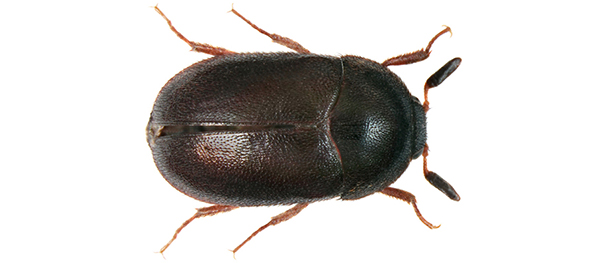
Insect of the Month
Black Carpet Beetle (Attagenus unicolor)
Description
Black Carpet Beetle Adults: Up to 4 mm (3/16 inches) long, dark brown to black. The last three antennal segments are slightly enlarged and form a sphere shape.
Black Carpet Beetle Eggs: Females lay 50-90 small, white eggs which hatch in 6-10 days. Eggs are deposited in concealed areas near larval food supply.
Black Carpet Beetle Larvae: Dark brown to reddish brown, up to 13mm (0.5″) long, slender, hairy, with a distinct tail of long hairs at tip; three pairs of thoracic legs.
Black Carpet Beetle Pupae: Pupal cases are brownish with dark beetles inside the pupal chamber.
Life Cycle
The female black carpet beetle will lay eggs in almost any dry organic substance. Larvae will feed off the food or fiber substance for about 9-20 months depending on the environment. The life cycle on average will be 11 months. Adults live for 30-60 days. One generation occurs per year depending on storage conditions.
Damage & Detection
Only larvae cause damage to plant or animal products or textiles. The presence of cast skins is usually apparent. Holes and frayed fibers in textiles also may be present.
Adult black carpet beetles are excellent fliers and are attracted to lights. The use of pheromone traps and inspections can determine the location and degree of infestation.
These beetles are commonly found in processed foods such as, spices, biscuits, meal, four, seeds, and dog food, but can also attack horn, untreated hides, wool, hair, silk, and dead insects. The black carpet beetle is a common household pest.
Fun Facts
- Commonly confused with other Anthrenus, Anthrenocerus, and Trogoderma species.
- Black carpet beetles initiate flight at temperatures above 22.5°C (73°F).
- Black carpet beetle larvae have hairs on their body called setae that can cause gastrointestinal irritation in infants, children, and at-risk individuals. They may also cause an allergic reaction.
- Adult black carpet beetles feed on pollen and nectar of flowering plants.
Recommended monitoring systems for the Black Carpet Beetle are:
- Hanging NoSurvivor Trap with PTL Multi-Species Bullet Lure (IL-408)
- All Beetle Trap with RTU Gel (IL-2750)

